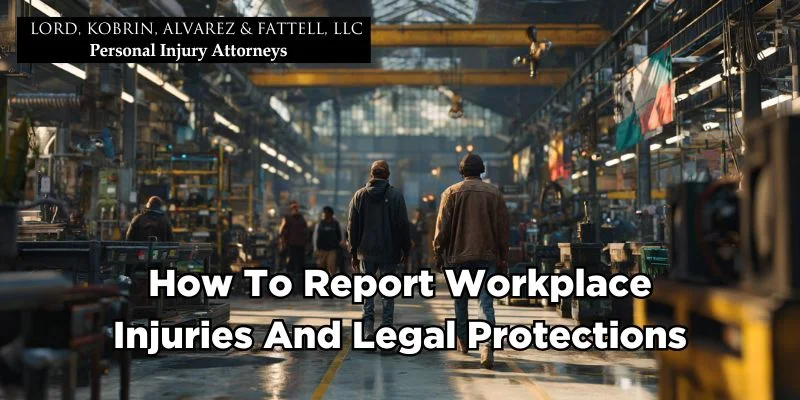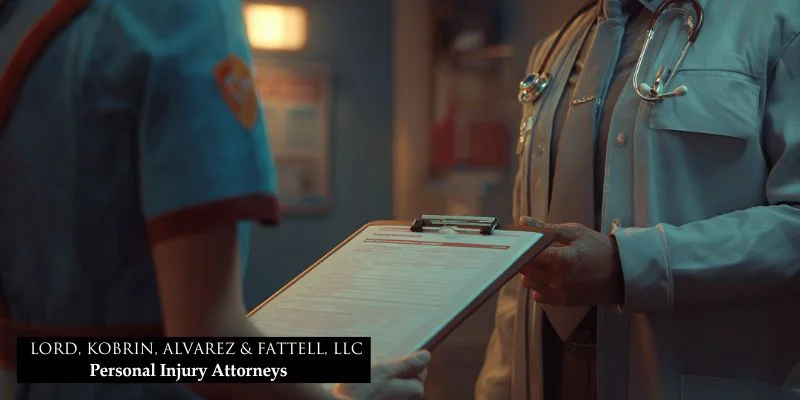How To Report Workplace Injuries And Legal Protections

Knowing how to report workplace injuries and legal protections is vital to safeguarding your health, rights, and benefits after an accident. Prompt reporting ensures proper documentation, medical care, and protection under workers’ compensation laws.
Table of Contents
Understanding Workplace Injuries and Your Rights

Workplace injuries can happen in any industry, from offices to construction sites. These injuries typically range from repetitive stress injuries to serious harm caused by lifting heavy objects or workplace accidents involving hazards. When an injury or illness is work-related, it’s crucial that both employees and employers understand their rights and responsibilities.
OSHA — the Occupational Safety and Health Administration — sets and enforces standards to ensure a safe and healthy workplace. Every injured worker has the right to a safe work environment and the right to report without fear of retaliation. An employer is required to provide a workplace free from recognized hazards and must follow workplace safety regulations.
If you are injured at work, you may be entitled to file a workers’ compensation claim to receive the compensation you deserve for medical expenses, lost wages, and any loss of income. To protect your rights as a worker, it’s important to understand these laws and ensure you’re protecting your rights throughout the process.
An experienced personal injury lawyer, such as those at Lord, Kobrin, Alvarez & Fattell, can guide you in understanding important laws, helping you assert your legal rights, and ensuring you get the compensation and support you need.
Step-by-Step Guide for Reporting a Workplace Injury

When a workplace injury occurs, follow these steps to protect your health and legal rights:
- Seek Medical Attention: Your well-being comes first. Get medical treatment as soon as possible to avoid aggravating the injury.
- Report the Injury to Your Employer: Notify your employer as soon as possible, including the date, time, and how the injury happened.
- Document the Injury: Write down detailed information about the incident, including any hazard that caused it, the type of injuries, and any witnesses.
- File a Complaint with OSHA: If you believe your safe work environment has been compromised, you have the right to file a complaint with OSHA.
- Use Personal Protective Equipment (PPE): If PPE or personal protective equipment was not provided by your employer and that contributed to the injury, note it in your report.
- Understand Your Rights: Read over your rights as a worker under your state’s workers’ compensation laws.
- Protecting Your Rights: Follow workplace safety protocols to prevent future workplace injuries and maintain a safe and productive work environment.
Reporting promptly helps ensure you can file a compensation claim and prevents disputes from employers or insurance companies.
Important Documentation for Reporting Injuries

Accurate documentation is vital when you report a workplace injury. Employers and employees must cooperate to provide necessary information.
You should:
- Keep detailed medical records showing diagnoses and medical treatment related to the injury.
- Maintain proof of medical expenses, including receipts and invoices.
- Provide your employer with written notice of the injury within the time frame required by workers’ compensation laws.
- Include information about the incident, such as the hazard involved, location, witnesses, and any PPE used.
- Keep records of communication with your employer and the workers compensation insurance carrier.
- Save copies of your injury claim paperwork, including a personal injury claim if you pursue a lawsuit against a third party.
This documentation is necessary when dealing with the insurance company, navigating the claims process, or if your claim is rejected and you need to appeal.
Legal Protections Available for Injured Workers

Injured workers have numerous legal protections. Workers compensation insurance is designed to provide financial support for employees hurt on the job, regardless of who was at fault. It helps cover medical expenses, lost wages, and compensation for reduced ability to work.
You have the right to report your injury without fear of retaliation. OSHA regulations protect your right to a safe workplace and your right to file a complaint if you believe those rights have been violated.
Workers compensation laws vary by state, but employers are generally required to provide workers compensation insurance to ensure a safe and healthy environment. If another party caused your injury, you may have grounds for an injury lawsuit against third party. In some cases, this personal injury lawsuit can provide additional compensation for your losses.
Seeking legal advice from a reputable law firm like Lord, Kobrin, Alvarez & Fattell ensures you understand your rights and the compensation you deserve under the law.
Navigating Workers’ Compensation Claims After Injury
The claims process for workers’ compensation claims can be complex. Understanding the laws and your rights is the first step.
- File a Claim Promptly: File a compensation claim with your employer’s insurance provider as soon as possible after the injury within statutory deadlines.
- Workers’ Compensation Insurance Carrier: Communicate clearly with the compensation insurance carrier during the claim process.
- Provide Medical Records: Supply medical records and information about the incident to prove it is work-related.
- Comply with State’s Workers Compensation Laws: These outline the timelines, benefits, and responsibilities of employers.
- Understand Personal Injury Protection: In some cases, you may also be covered under personal injury protection if other insurance applies.
- Return to Work Assessments: If cleared, follow medical advice for a safe return to work.
- If Claim is Denied: An injury lawyer or personal injury lawyer can help appeal and ensure you get the compensation and support you need.
Dealing with insurance companies can be challenging, but by following the right steps, you improve your chances of a positive outcome.
When to Seek Legal Advice After a Workplace Injury
It’s important to seek legal advice when you are hurt on the job and unsure about your rights or benefits. An experienced injury lawyer can help injured workers navigate the claims process, protect their legal rights, and advise if they need to file a personal injury lawsuit.
You should consult an injury lawyer if your injury claim is rejected, your employer disputes that the injury happened at work, or your compensation insurance does not fully cover your medical expenses or lost wages.
Employers and employees each have responsibilities, but sometimes protecting your rights requires additional legal support. A law firm such as Lord, Kobrin, Alvarez & Fattell can schedule a free consultation to review your case and help you understand your rights and responsibilities under workers compensation laws.
By understanding your rights, following the correct steps to report the injury, and preventing future workplace injuries, you can maintain a safe and productive work environment.
Our dedicated team is ready to fight for your rights.
908-232-7666TAP TO CALL
